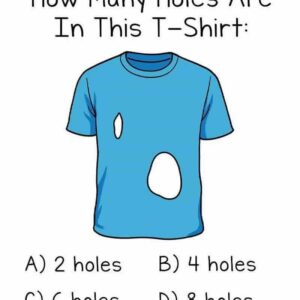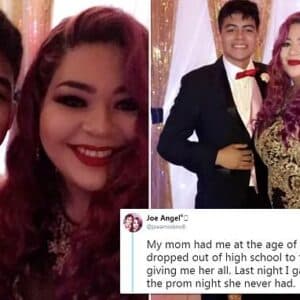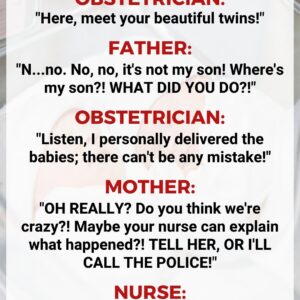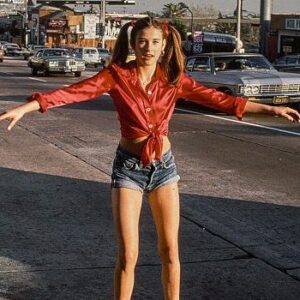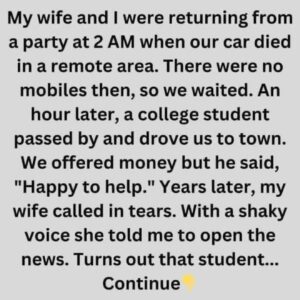My grandpa was the stingiest man I’ve ever known.
The kind of man who rinsed out ziplock bags to reuse them, cut paper towels into thirds, and turned off the lights if you left a room for more than three seconds. At restaurants, he’d pocket sugar packets and complain the portions were “for birds.” At Christmas, he’d give me socks—always on sale, always with the sticker still partially on.
So when he died and the lawyer handed me a sealed envelope labeled For My Grandson, I wasn’t expecting much.
Inside was a single slip of paper.
A coupon.
$100 off any in-store purchase.
No expiration date.
No store chain I’d ever heard of.
I stared at it for a long time. It was printed on thick, stiff cardstock with faded red ink and elegant cursive. It looked old—older than me, older than my parents. The logo at the top was a simple triangle with a line through it.
I almost laughed.
My grandpa had left my cousins an old car, some savings bonds, and a piece of land he’d bought in the seventies.
Me? A coupon.
For a week, I kept it folded in my wallet, mostly out of spite. Throwing it away felt like losing the last joke in a long, weird routine between us. Still, every time I opened my wallet at a coffee shop or grocery line, it slipped out just enough for me to see that strange logo, that old-fashioned ink.
It nagged at me.
One Saturday, after too little sleep and too much overthinking, I decided to use it.
There was a branch of the store listed on the coupon across town, tucked in the corner of a half-dead strip mall between a laundromat and a nail salon. The sign above the door was sun-faded, the letters slightly crooked, like the building had given up on looking impressive a long time ago.
Inside, though, it was just… a store.
Fluorescent lighting. Background music that sounded like every song you’ve ever heard in an elevator. Aisles with the usual stuff: cleaning supplies, snacks, home goods. Nothing mystical. Nothing special.
I grabbed a few basics—a bag of rice, some soap, a pack of socks I didn’t really need. When I reached the register, I put the items down and offered the coupon like it was no big deal.
The cashier took it without looking, scanned the first item, and then glanced down at the slip in her hand.
She froze.
Her eyes widened. Her cheeks paled. Her gaze flicked from the coupon to me, then back again, as if she was trying to confirm I was real.
“Um,” she said. “Can you… hang on a second?”
“Sure?” I said.
She didn’t wait for an answer. She hurriedly waved for the manager, her voice tight. “Mark? Can you come here? You need to see this.”
The manager was one of those guys who looked permanently tired—salt-and-pepper hair, shirt sleeves rolled up, name tag slightly askew. He walked over, clearly expecting a price check or a void, something routine.
“What’s the issue?” he asked.
She silently handed him the coupon.
He looked at it once, then again, this time bringing it closer to his face. The lines around his eyes deepened. His posture straightened.
“Where did you get this?” he asked quietly.
I swallowed. “Uh… it was my grandpa’s. It was in his will.”
He flipped the coupon over, checking the back, the edges, even the watermark against the light. Then he did the one thing that made the hair on my arms stand up.
He sniffed it.
The cashier took a tiny step backward, like she was afraid the thing might explode.
“Come with me,” the manager said.
I blinked. “What? Why? Is it fake or something?”
He shook his head once, sharply. “Not fake. Just… rare. Bring your items and the coupon. We’ll sort it out in the office.”
The people behind me pretended not to listen but leaned in anyway. I shoved the coupon back into my pocket, grabbed my stuff, and followed him through a gray metal door marked Authorized Personnel Only.
The hallway smelled like mop water and burnt coffee. He led me into a cramped office with yellowing walls, old filing cabinets, and a corkboard crowded with curling memos and faded Polaroids. He shut the door behind us with a soft but deliberate click.
“Sit,” he said.
I sat.
He crossed to a filing cabinet, unlocked the bottom drawer, and pulled out a battered black binder stamped with block letters:
LEGACY COUPONS — LEVEL 7 CLEARANCE ONLY.
That didn’t sound like something you’d need for $2 off toilet paper.
He flipped through plastic sleeves full of old papers—odd designs, strange logos—until he stopped on a page. His finger landed on an image identical to the coupon in my pocket.
“Here,” he muttered. “1972. Five printed.”
He looked at me. “You said it was your grandfather’s?”
“Yeah,” I said slowly. “He was… the definition of cheap. I’m surprised he didn’t use it himself.”
The manager’s mouth twitched. Not quite a smile, not quite a frown.
“This isn’t a regular coupon,” he said. “Back in the early ’70s, our company ran a… special promotion. A test. They sent these out to five specific people as part of an experiment. A kind of loyalty trial, mixed with something else.”
“What kind of something else?” I asked.
He hesitated, then walked to a locked cabinet on the wall and took out a manila folder stamped in red:
CONFIDENTIAL — FOUNDERS’ PROGRAM.
Inside were black-and-white photographs—grainy images of men in suits holding up the same style of coupon. In one of the photos, a younger version of my grandpa stared up at me, sharp-eyed, expression unreadable.
My breath caught.
“That’s him,” I said. “That’s my grandpa.”
The manager nodded slowly. “Each of the five recipients was chosen. We don’t know the criteria—just that it came from the original founders. We’ve tracked what happened when those coupons were redeemed. Four of them were used decades ago. Each time… something unusual followed.”
I tried to scoff, but my throat had gone dry. “Like what? They got a really good deal on dish soap?”
He ignored the joke.
“One man bought a washing machine. The delivery driver ended up becoming his wife. Together they started a small repair shop that grew into one of the biggest appliance chains in the region.
“Another used it on a cart full of groceries. One of the cans had a rare coin wedged underneath the label. That coin turned out to be worth over three million dollars.
“A third tried to sell his coupon instead of redeeming it. He became obsessed with getting the highest offer. Eventually, he vanished. No records. No forwarding address.”
I shifted in my chair. “And the fourth?”
“The fourth donated it to a charity raffle. A single mom won it. She spent the $100 on baby formula and diapers. A local paper picked up the story about her win. She got invited onto a talk show. A book deal followed. She’s now a bestselling author with her own foundation.”
Silence settled between us.
“And the fifth?” I said quietly.
He looked straight at me.
“You’re holding it.”
My pulse thundered in my ears.
“So… what? You think this is magic? Cursed? Blessed? You expect me to believe a piece of paper decides people’s destinies?”
He closed the binder gently.
“I expect you to understand that patterns matter,” he said. “The people who used this coupon had their lives changed. Sometimes by luck. Sometimes by choices. But the coupon… it was always at the center.”
He leaned forward, elbows on the desk.
“You can walk out there and redeem it like any other discount. Buy whatever you want. Snacks. Towels. A blender. Or you can walk away and tear it up in the parking lot. That’s your call. We can’t force your hand.”
I stared at him.
“This is insane,” I muttered.
He held my gaze. “Is it?”
I left the office feeling like the floor had tilted ten degrees. The fluorescent lights buzzed overhead, aisles stretching out in front of me like long, narrow futures.
Before, this had been a grocery store.
Now it felt like a maze.
I walked slowly, pushing an empty cart, eyes scanning the shelves. Every item suddenly seemed loaded with possibility. Chips? Mundane. Shampoo? Necessary but hardly life-defining. A novelty jellyfish lamp that changed colors? Cool, but it didn’t feel… right.
I passed electronics, toys, cleaning supplies. Nothing tugged at me.
Then I saw it.
In a dusty glass case near customer service was a shelf labeled Collector’s Clearance. Inside, half-hidden behind an old figurine and a cracked decorative plate, sat an antique camera.
It was boxy and solid, with a cracked leather strap and brass knobs gone dull from time. A hand-written tag dangled from it:
ANTIQUE CAMERA – $99.99.
I waved an attendant over.
“Does this thing actually work?” I asked.
She shrugged. “It’s been here longer than I have. Some guy traded it in ages ago. Management stuck it there and forgot about it. I think it’s functional.”
I looked at the camera, then at the coupon in my hand.
It was completely impractical. I didn’t need it. It might not even work.
But something about it felt… important.
“I’ll take it,” I said.
At the register, I placed the camera down and handed over the coupon.
The cashier scanned it carefully, her hands trembling just a bit. The register beeped, affirmed the discount.
“Total comes to zero,” she said faintly.
When she handed me the receipt, the hairs on my arms stood up.
As I walked out of the store with the camera, the evening air felt different—heavier, like it was paying attention. The sky had that gray-blue color right before full dark, and the parking lot lights flickered on one by one.
The camera vibrated slightly in my hands.
Not much—a faint hum, like something waking up.
I stopped under a streetlight, lifted it to my face, and aimed it at the row of cars.
“Alright, grandpa,” I muttered. “Let’s see what you’ve dragged me into.”
I pressed the shutter.
Click.
No flash. No whirring. No photo slid out.
Just silence.
Weird.
I lowered the camera.
A man walking past me suddenly stumbled, then turned to stare.
“Do I know you?” he asked, frowning.
“No,” I said slowly. “I don’t think so.”
He stared a second longer, opened his mouth like he wanted to say more, then shook his head and hurried off.
I chalked it up to coincidence.
At home, I set the camera on my table and spent the evening doom-scrolling, trying to convince myself I hadn’t just been recruited into some corporate cult. Every so often, my eyes drifted to the camera. It just sat there, quiet and harmless.
Around midnight, restless, I picked it up again and aimed it at the apartment window.
Click.
No sound. No photo.
But when I looked out the window, a car I didn’t recognize idled at the curb. A black sedan. Tinted windows. Engine humming softly.
It hadn’t been there a second earlier.
I frowned. Grabbed a bag of trash as an excuse and went downstairs. As soon as I stepped onto the sidewalk, the sedan pulled away, taillights glowing red as it disappeared down the street.
The next day, it was back.
Same car. Same spot.
I stared at it from behind my curtain.
Then, very deliberately, I lifted the camera and took a picture of my front door.
Click.
A moment later, someone knocked.
Three sharp raps.
I froze.
Then remembered: it hadn’t knocked.
It had rung.
Except I hadn’t heard a doorbell.
Heart racing, I opened the door a crack.
No one was there.
Just a plain envelope on the doormat.
No address. No stamp.
Just that same symbol from the coupon and my grandpa’s will—the triangle with a line through it.
My hands shook as I opened it.
Inside was a single card with neat handwriting:
Keep taking pictures.
But choose carefully.
I swallowed hard and looked down the hall.
Empty.
I shut the door, leaned my forehead against it, and tried to breathe.
Eventually, my eyes landed on the mirror across the room.
On impulse, I raised the camera and aimed it at my reflection.
Click.
This time, the camera flashed.
The room shifted.
For a dizzying second, everything blurred.
Then the air smelled different. Damp. Earthy.
I dropped my arm and looked around.
My apartment was gone.
I stood in the middle of a forest.
Trees towered above me, tall and dense, branches woven together like a canopy of dark lace. The ground was soft under my shoes, littered with leaves and moss. Somewhere in the distance, water rushed over rocks. Birds screeched overhead, a sound too loud, too wild.
My heartbeat thundered in my ears.
“Nope,” I whispered. “Nope nope nope.”
My fingers tightened around the camera like it was the only solid thing in the world.
I aimed it at the nearest tree.
Click.
The forest dissolved.
My living room snapped back into place like someone had hit undo on reality. I stumbled backward, bumping into the couch, lungs heaving.
The camera felt heavier now. Warmer.
I set it down on the table very gently, like it might explode if I dropped it.
My phone buzzed.
Unknown number.
They know now.
Run.
The message blinked once, then vanished before I could screenshot it.
My doorbell rang.
I didn’t move.
The bell rang again. Then came the pounding—the full-body, someone’s-trying-to-break-in kind.
I grabbed the camera with shaking hands and pointed it at the door.
Click.
Silence.
The pounding stopped.
I crept to the peephole and looked.
No one there.
Just an empty hallway.
And a single men’s shoe sitting in the middle of the floor, as if the person wearing it had taken a step and then… ceased to exist.
I backed away slowly.
I didn’t sleep that night.
The camera sat on the table between me and the door. I watched it, waiting for it to move, to hum, to do anything. It didn’t.
Not until dawn.
That’s when I noticed it.
A photograph lay beside it.
I hadn’t used any film. I hadn’t loaded anything. But there it was.
I picked it up with numb fingers.
The picture was grainy, slightly blurred: a room with stone walls and high ceilings. People in dark robes stood in a circle around a pedestal. On the pedestal sat the camera.
My stomach twisted.
These weren’t random coincidences.
This was a trail.
I spent the next afternoon digging through my grandpa’s boxes in the closet—old receipts, newspaper clippings, notebooks. Finally, at the bottom of a worn suitcase, I found a leather-bound journal tied shut with a cracked elastic band.
The first page held his familiar, tight handwriting. It wasn’t about baking pies or paying bills.
It was about the camera.
Camera acquired: 1972, Founders’ Program.
Not a camera in the traditional sense. Does not capture what is. Captures what could be.
There were sketches—beams of light bending through glass, branching into different paths like veins. Notes in the margins:
Test 1: Doorway, January. Result: alternate layout?
Test 9: Street corner. Car appears. License plate altered.
Test 23: Self-portrait. Unusable. Too much variance.
Every entry was signed the same way:
Take only what you’re ready to face.
I sat back, the journal open on my knees, the camera staring at me from the table.
“Why me?” I asked the empty room.
The camera answered.
Click.
No one had pressed the shutter.
A photograph slid out from somewhere inside, fully developed.
It was me.
Older—maybe late thirties, early forties. I had lines around my eyes, a rougher jawline, a worn jacket. But I was smiling. Really smiling. Behind me, a massive vault door stood open, light spilling out from within, so bright it almost washed out the rest of the image.
In my hands, I held the camera.
Beside me stood another figure—someone I couldn’t fully make out. Their face, for some reason, was scratched out, the surface of the photo torn just enough to erase their features.
At the bottom, in faint handwriting that wasn’t mine, were four words:
You are the fifth.
I stared at that photo until my eyes burned.
Then I got up, grabbed a backpack, and started packing.
Food. Water. A change of clothes. The journal. The coupon envelope. The camera, wrapped carefully in a towel.
I locked my apartment behind me without knowing if I’d ever really live there again.
The world outside looked the same, but I moved through it differently. Every street sign, every alleyway, every stranger’s face felt like a potential choice.
I took a picture of a train platform.
Click.
I was suddenly somewhere else—another station, another city, same time of day but different announcements, different accents around me.
I took a picture of a door with no label.
Click.
Inside, people in suits sat around a conference table, talking about a contract that hadn’t been written yet.
I took a picture of a billboard advertising a bank.
Click.
I stood in a cavernous vault, rows of safety deposit boxes lining the walls.
Some photos took me to places dangerous and sharp: arguments mid-swing, deals gone wrong, rooms where people whispered things they weren’t supposed to say out loud. Other photos dropped me into quiet moments: a woman singing to a baby in a language I didn’t understand, an old man feeding birds on a bench, a teenager walking away from a car accident that never made the news.
Choices.
Consequences.
Branches of possibility.
Somewhere along the way, fear loosened its grip just enough for something else to grow in its place—understanding.
My grandfather hadn’t been hoarding pennies for the thrill of it. He’d been guarding this.
Hiding it behind the harmless mask of “stingy old man,” keeping it off the market, away from people who would use it to turn the world into a rigged game.
He’d chosen not to spend the coupon.
He’d chosen to pass it down.
To me.
Not because I was special, but because at some point, I’d proven I wouldn’t sell it to the highest bidder or use it to cheat my way into everything I’d ever wanted.
Instead, I redeemed it on an antique camera no one cared about.
A $100 coupon.
The cheapest, most expensive thing I’ve ever used.
I thought I was just being stubborn, honoring my grandpa’s last little joke.
Instead, I stepped into something much bigger.
Now, I take pictures sparingly.
Never when I’m angry. Never out of greed.
Only when I’m ready to face what comes next.
Because my grandpa was right.
Some opportunities don’t look like gold coins or winning lottery tickets.
Sometimes they look like an old man’s coupon you almost throw away.
And if you choose to use it?
It might just change everything.
